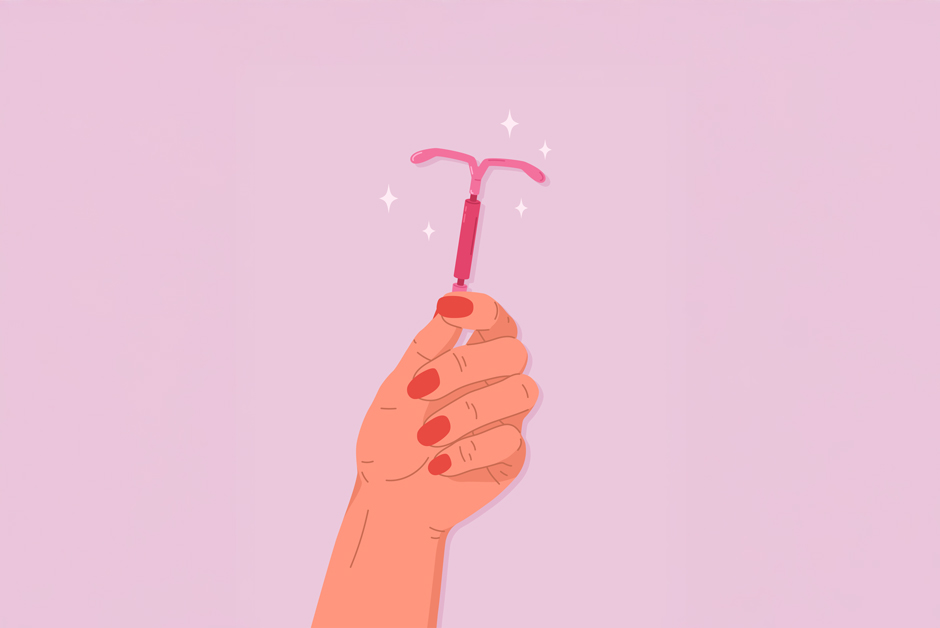Bleeding between periods is called spotting. It’s usually a small amount of blood that does not require a sanitary towel or tampon. Most women will experience abnormal bleeding at some point in their lives and whilst in most cases it’s harmless, it can signify something a bit more serious is going on, so it’s always best to get it checked by your GP or gynaecologist.
What can cause bleeding between periods?
Bleeding between periods can be caused by a number of factors:
- Birth control: It’s common to experience some spotting when you first start hormonal birth control as a result of changes in the uterus. If you’re on the pill and are late taking one or forget one, you may have some spotting. Additionally, if you have an IUD fitted this can also increase your chance of abnormal bleeding between periods.
- Stress: Whatever the cause, intense periods of stress can impact you physically as well as mentally. If you’re really stressed you may notice changes to your menstrual cycle – it may be longer, shorter or even more painful. Why? Stress triggers the fight or flight mode in the body, which creates an abundance of the stress hormone, cortisol. Cortisol can suppress reproductive hormones, impacting ovulation and resulting in abnormal ovulation or no ovulation.
- Sexually transmitted infection (STI): STIs are a common cause of spotting, particularly with chlamydia. Women with chlamydia may have spotting between periods and/or during and after sex (postcoital bleeding). Gonorrhoea is another STI that can cause bleeding between periods, but this is usually accompanied by vaginal discharge. If you’ve had unprotected sex, or are concerned you may have an STI, our sexual health service provides quick, effective testing to put your mind at ease.
- Infections: Infection of any of the pelvic organs (cervix, fallopian tubes, uterus, ovaries or vagina) can lead to abnormal bleeding, including conditions like bacterial vaginosis and pelvic inflammatory disease (PID).
- Fibroids and polyps: These non-cancerous growths, often found in the lining of the uterus, can be the cause of unusual bleeding, pelvic pain, urinary problems, and even lower back pain.
- Pregnancy: Whilst it’s normal to experience a small amount of bleeding in early pregnancy, this should always be investigated by a healthcare professional. If the bleeding is heavy and before 12 weeks, this could be a sign of ectopic or miscarriage, and you should seek immediate medical attention.
- Polycystic ovary syndrome (PCOS): Caused by a hormone imbalance, PCOS is a condition that affects ovulation, meaning the eggs aren’t released from the ovaries in the way that they should. This condition also means the body produces too many androgens which can lead to abnormal bleeding.
- Cervical cancer: Cancer Research UK states that 3,152 cases of cervical cancer are diagnosed each year. Cervical cancer has a 51% survival rate, but 99.8% of cases are preventable. This really emphasises the importance of having a regular smear test to pick up on any abnormalities early so appropriate action can be taken. Signs of cervical cancer include postcoital bleeding, pain or discomfort during sex, changes to vaginal discharge and unexplained pain in the lower back or pelvic region.
- Perimenopause: As women age, the oestrogen levels in the body decrease as menopause approaches. With the sex hormones fluctuating, periods can change, becoming more unpredictable, and the duration of the period may become shorter, longer and flow may also change.
- Adenomyosis: A condition in which cells from the lining of the uterus break through the wall of the uterus. It’s thought that 1 in 10 women will have this condition. Adenomyosis can make your periods last longer than usual and can cause pain during sex.
- Uterine cancer: Uterine cancer is quite common and generally affects postmenopausal women. Women over 40 with spotting should visit their GP or gynaecologist to rule out uterine cancer. This can be diagnosed with a vaginal ultrasound.
When to see a doctor about spotting between periods
Dr Albert Aka, Consultant Gynaecologist at The Gynae Centre says: “If you experience any spotting you should visit your GP or gynaecologist to get it checked and to rule out anything serious – it’s always better to be safe. Your GP or gynaecologist may recommend a pregnancy test (this will depend on your age), a pelvic exam, cervical screening test, or an ultrasound scan to ascertain the cause of any bleeding in order to provide appropriate treatment for the condition.”
A gynaecologist can be a great option if you feel nervous about talking about sensitive issues as they are used to dealing with this every day and are well versed at putting patients at ease. At The Gynae Centre our entire team, from our consultants to our nurses and admin team are sympathetic and understanding so you can feel completely comfortable.
Call us to book an in-clinic, telephone or video consultation from anywhere in the UK. Simply call us on 020 7580 8090 and we will be happy to help. Alternatively, you can book online.






